Kulikova Anna, student of grade 5
More than 200 years ago, the letter "ё" entered the Russian language. Her amazing fate captivates with its amusement and amazes with drama. The very development of the Russian language has long proved the indisputable necessity of this letter, but recently, more and more often, the spelling and typing of the letter “ё” is not necessarily required. The paper discusses the causes of discrimination of the letter "ё" and the consequences of this phenomenon.
The work was awarded a diploma of the II degree at the XVIII All-Russian scientific-practical conference "Scientific creativity of youth" (2014).
Download:
Preview:
Municipal budgetary educational institution
"The main secondary school number 17"
Anzhero-Sudzhenskogo urban district
Problems of using the letter "ё" in Russian
Kulikova A.S.,
5th grade
Scientific adviser:
Bogodukhova O.V.,
teacher of Russian language
Anzhero-Sudzhensk, 2014
Introduction 3
- The history of the appearance of the letter "ё" 4
- The history of the spread of the letter "ё" 5
- Supporters and opponents of the letter ё 6
Chapter II Consequences of the optional use of the letter “e” 8
Chapter III. The letter "ё" in modern Russian
3.1. The use of the letter "ё" in government documents 10
3.2. Using the letter ё in school books 11
3.3. The use of the letter "ё" in fiction 11
3.4. Use of the letter ё in the media 12
3.5. Attitude to the letter “ё” of teachers and students of the school 12
3.6. Using the letter ё in Everyday Life 13
Conclusion 14
References 15
Appendix 16
Introduction
More than 200 years ago, the letter "ё" entered the Russian language. Her amazing fate captivates with its amusement and amazes with drama. The very development of the Russian language has long proved the indisputable need of this letter
Recently, there is an optional writing and typing of the letter "ё". One letter, or rather, the absence of the "ill-fated" two points entails a violation of not only the communicative, cognitive functions of the language, but also material problems. This is the non-payment of benefits, the refusal to issue documents, certificates, etc.
Despite the fact that several government decrees have been adopted confirming the need for the obligatory spelling of “ё” at least in proper names, most printed publications are published without “ё”.
Thus, the topic seems to be very relevant, as it is of fundamental importance for the further development of the Russian language.
purpose of work : Examine the causes of discrimination of the letter “ё” and the consequences of this process.
To achieve this goal, it is necessary to solve the followingtasks :
- get acquainted with the history of the appearance of the letter "ё" in the Russian alphabet;
- identify the causes of discrimination of the letter "ё" in Russian;
- conduct a sociological survey in order to identify the attitude of teachers and students towards the use of the letter ё in Russian.
Hypothesis: if the general public will be aware of the norms for using the letter "ё" in Russian, this will avoid inaccuracies and errors in written language.
In the course of work, a variety of research methods were used:
- study of literature and Internet sources on the problem;
- method of collecting information (questionnaire, survey, interviewing);
- analysis method.
Object of study: The process of Yefification of the Russian language.
Subject of study: The current position of the letter ё in Russian.
Chapter I. The history of the appearance and spread of the letter "ё"
1.1. The history of the appearance of the letter "ё"
November 18, 1783 In the house of the director of the St. Petersburg Academy of Sciences Princess Yekaterina Romanovna Dashkova, one of the first meetings of the recently created Russian Academy was held.
This meeting was attended by G.R. Derzhavin, D.I. Fonvizin, Ya.B. Knyazhnin, I.I. Lepekhin and others. The draft of the full explanatory “Slavic-Russian Dictionary”, later known as the Dictionary of the Russian Academy of Sciences, was discussed.
But the debate subsided, all questions were exhausted, and the academics were about to leave for their homes. Suddenly, Ekaterina Romanovna asked those present whether someone could write the word "Christmas tree."
The academics decided that the princess was joking, but Ekaterina Romanovna, having written the word she uttered: "iolka", asked whether it was legitimate to depict one sound in two letters? And is it not better to introduce a new letter E? Dashkova’s arguments seemed convincing, and soon her proposal was approved by the general meeting of the Academy. So November 18 (29), 1783 became the birthday of the new Russian letter.
But the letter ё was not included in the “Dictionary of the Russian Academy of Sciences” created at that time.
Princess Dashkova was never able to introduce her project into the printing industry, most likely because of the economic one: it was not cheap to make letters of the letter ё.
Why at the end of the 18th century there was a need to create a new letter of the Russian alphabet? And why wasn’t it among the letters initially?
The fact is that in the Old Russian language initially there were no phonetic phenomena for which the letter “ё” might be needed. This letter reflects on the letter a phenomenon that arose later in Russian colloquial speech.
In the XII-XIII centuries in Old Russian spoken language, a phonetic phenomenon arises, which linguists call “youkanye,” that is, the transition of e to under stress after soft consonants before solid ones (carried, carried, sister-sisters, fly-flight, etc.). Church Slavonic language, which has served as a literary language in Russia for many centuries, has not accepted a letter reflecting a “fucking” pronunciation.
The Ё oeking ’pronunciation gradually began to penetrate into Russian writing. But there was no special letter for its reflection in the alphabet. E.R. Dashkova ingeniously simply solved this issue by entering the letter "ё" with two dots on top. But Ekaterina Romanovna was never able to introduce the letter “ё” in Petersburg printing houses.
For the first time, the letter “ё” was introduced into the press by N.M. Karamzin. IN1796 year , in the first book of the poem published by Karamzinalmanac “Aonides”, coming from the same university printing house, with the letter “ё” the words “dawn”, “eagle”, “moth”, “tears” were printed, as well as the firstverb "Flowed." However, it is not known whether it was Karamzin's own idea or the initiative of one of the publishing house employees. It should be noted that in scientific works (for example, in the famous "History of the Russian State",- ) Karamzin did not use the letter "ё".
1.2. The history of the spread of the letter "ё"
Although the letter "ё" was proposed in1783 , and in print used in1795 , for a long time it was not considered a separate letter in the alphabet
The spread of the letter "ё" in the 18th-19th centuries was hindered by the attitude to the "canting" pronunciation as a philistine, while the "church" "creeping" reprimand was considered more noble and intelligent.
On December 23, 1917, the People's Commissar of Education A.V. Lunacharsky signed a Decree, which he introduced as a mandatory reformed spelling and, among other things, said: “Recognize the use of the letter ё as desirable, but not mandatory. What the Academy of Sciences fought for, realizing the necessity of the mandatory use of the letter "ё", remained unrealizable, because the introduction of the letter "ё" (at least partially) would require the production of many letters for printing houses, which the Soviet government had in the conditions of the civil war there were no funds or materials.
In the midst of World War II, the military faced an unpleasant surprise: a careless attitude to the letter “ё” led to confusion when reading the names of settlements (Berezino or Berezino?). This, in turn, has caused numerous losses. It turned out that the German operational maps of our territory were not only topographically more accurate than ours, but also impeccably toponymic. Oh, if Oryol, then Oryol, and if Berezovka, then Berezovka, not Birch.
Topographical errors had to be corrected during the retreat. Therefore, complete nonsense is the assertion that the introduction of the letter "ё" was the folly of the tyrant - Stalin. No and no again. “It was a dictate and the absolute need for the brutal realities of war,” say historians Pchelov and Chumakov .
December 24th 1942 by order of the People's Commissar of EducationRSFSR VPPotyomkina was introduced the mandatory use of the letter "ё" and since that time it is officially considered to be part of the Russian alphabet. The rules for using the letter “ё” were included in spelling guides, and replacing it with “e” was considered a mistake.
The next ten years, fiction and scientific literature came out with almost continuous use of the letter "ё". However, over time, publishers for some reason gradually began to “forget” about this letter,use it only in case of emergency,and soon "ё" almost completely disappeared from print. It was not on typewriters, and only if necessary, two dots were printed over the letter "e" using the "quotation mark" key.
In 1956, the selective use of the letter “ё” was fixed as the norm of Russian writing. Over time, the letter “ё” could only be seen in books for the smallest or in Russian language textbooks for foreigners.
1.3. Supporters and opponents of the letter "ё"
Attitude to the letter "ё" has always been ambiguous.
Negative attitude to the letter "ё" was a big obstacle to its distribution. Sometimes it even reached the point of absurdity. Minister of Education Alexander Semenovich Shishkov
(1754-1841), for example, the volume after volume flipped through his books, erasing from them two hated points. The main argument of the opponents: the letter "E" is not originally Russian, it was borrowed from the French language, which means it is alien to our language.
Marina Tsvetaeva basically wrote the “devil”, and Andrei Bely wrote “zholty” through the letter “o”.
Venedikt Erofeev in the play “Walpurgis Night, or the steps of the Commander” writes: “Scoundrel Karamzin - he came up with the same letter“ E ”. After all, Cyril and Methodius already had B, and X, and F ... So no. This didn’t seem enough for Estet Karamzin ... "
The prominent linguists L.V. Shcherba and A.A. Reformatsky were bright defenders of the letter "ё".
Nikolai Alekseevich Nekrasov in the poem “To whom it is good to live in Russia” uses the word “birch bark”, which now almost everyone pronounces as “birch bark”.
"And the rest as long as
A cup was made,
Birch barking. ”
Considering that "birch" is more correct than "birch", as it is formed from the word "birch".
An ardent supporter of this letter was the Nobel laureate, academician of the Russian Academy of Sciences Alexander Isaevich Solzhenitsyn. He persistently used the word "girl" through "ё". In one of his works, he wrote: "I feel painfully this last loss of our language."
Chapter II The consequences of the optional use of the letter "ё"
The slow (and so to the end not completed) entry of the letter "ё" into life is explained by its form that is inconvenient for fast writing, which contradicts the main principle of cursive writing: fused writing (without tearing the pen away from paper), as well as the technical difficulties of publishing technology before computer time. The traditional optionality of use led to erroneous readings, which gradually became generally accepted. They affected everything: a huge mass of personal names, and many common nouns.
Change the spelling of names
So, for example, the letter "ё" disappeared from the spellings (and then pronunciations) of the surnames: cardinalRichelieu (fr. Richelieu) , philosopher and writerMontesquieu (fr. Montesquieu), physics X-ray (him. Wilhelm conrad röntgen ), microbiologist and chemist Louis Pasteur (fr. Pasteur ), artist and philosopherN.K. Roerich et al. We are still convinced that Dumas has a cardinal not Richelieu, but Richelieu. And we think that the actor’s name is Depardieu, but not Depardieu.
The surname of the famous Russian poet Afanasy Afanasevich Fet (German in origin) was distorted when his first book was printed. And now the famous poet Fet is referred to as Fet.
Surname of the famous French singerMireille Mathieu it was written and pronounced incorrectly for a long time - "Mothere. "
The letter "ё" has disappeared from the name of the nobleman Levin, the character of the novelL. N. Tolstoy « Anna Karenina "Whose last name has turned into"Jewish" “Levin.” Here the hero shared the fate of the author: Tolstoy was calledLeo, not Leo , as evidenced, for example, by his intravital foreign publications with the nameLyof or Lyoff on the cover.
Incorrect spelling
Widespread mispronunciation of the names of cities, rivers and other geographical names.
So, in Soviet times, the incorrect pronunciation of the name of the city became widespreadKonigsberg .
The emergence of new orthoepic variants
The ambiguity has led to the fact that sometimes the letter "ё" is used in a letter (and accordingly read ["o]) in words where it is not needed. For example," scam "instead of" scam "," grenadier "instead of" grenadier "," being ”instead of“ being ”,“ custody ”instead of“ custody. "Sometimes such an incorrect spelling and pronunciation becomes common. So,world chess champion known to many asAlexander Alyokhin , in fact, was Alekhine and was very indignant when his name was spelled and pronounced incorrectly. His surname is the noble family of the Alekhins, and not the derivative of the familiar variant of the name Aleksey - "Alyokha."
Due to the optional use of the letter “ё”, words appeared in Russian that are permissible to write both with the letter “ё” and “e”, and pronounce accordingly. For example, “faded” and “faded”, “whitish” and “whitish”, “maneuver” and “maneuver”.
Erroneous pronunciation and emphasis are spread in such words: convict, beetroot and others.
The lack of consistent use of the letter "ё" is more of an artificial factor than a natural one. And this factor slows down the natural development of the language, generating and supporting the existence of pronunciation variants that are not conditioned by intralinguistic reasons.
Chapter III. The letter "ё" in modern Russian
The norms of the modern Russian language are governed by the "Rules of Russian Spelling and Punctuation,"approved in 1956 by the Academy of Sciences of the USSR, the Ministry of Higher Education of the USSR and the Ministry of Education of the RSFSR.
In paragraph 10 of this document, cases of mandatory use of the letter "ё" are fixed:
1. When it is necessary to prevent an incorrect reading and understanding of a word, for example: “recognize” as opposed to “recognize”, “everything” as opposed to “everything”; “Bucket” as opposed to “bucket”; “Perfect” (participle) as opposed to “perfect” (adjective).
2. When you need to specify the pronunciation of a little-known word, for example: the Olekma River.
3. In special texts: primers, school books of the Russian language, textbooks of orthoepy, etc., as well as in dictionaries to indicate the place of stress and the correct pronunciation.
Meanwhile, the situation with the letter "ё" is still ambiguous.
On the one hand, this document is fixedoptional use of the letter "ё". On the other hand, the Interdepartmental Commission on the Russian Language, headed by Andrei Fursenko, Minister of Education and Science of the Russian Federation, announced in the spring of 2007 that the letter “ё” is mandatory for general use. The commission sent an explanation to the federal government bodies and the constituent entities of the Federation stating that the refusal to use the letter “ё” is a violation of the requirements of the Federal Law “On the state language of the Russian Federation”.
Minister of Education and Science of the Russian Federation A.A. Fursenko believes that the use of the letter "ё" is mandatory.According to the minister, neglect of “ё” contradicts existing legislation and rules. “We have Russian, and no one has removed the letter“ ё ”from it, either spoken or written. It is absolutely clear that the letter “ё” must remain in the Russian language, ”he said.
Consider how the letter "ё" is used in government documents, school books, fiction, as well as on the pages of print media.
3.1. The use of the letter "ё" in government documents
About 3% of citizens of the Russian Federation have last names, first names or patronymics, which contain the letter "ё"and often the entry in the passport is distorted.
A state document, like a document issued by a state body to a citizen, published with the consistent use of the letter “ё”, is spelling perfect and, from this point of view, its criticism is impossible. Otherwise, the document becomes an object of criticism and ridicule, from which there is no protection, because there is a fact that instead of the seventh letter of the alphabetё completely different printed - sixth letter -e . In addition, the meaning (semantics) of what is written is often distorted.
There are cases when in the passports instead of the letter “ё” a different letter is printed - “e” in the name of the settlement where the owner was born: Venev, Orel, Chisinau - instead of Venev, Orel, Chisinau; or the streets where it is registered (registered): Suschevskaya, academician Korolev, instead of Suschevskaya, academician Korolev - all this can be an obstacle to the conclusion of the transaction.
I conducted an analysis of the personal files of students in grades 8–9, as a result of which it was revealed that in 10 students the actual data and passport data are different (Appendix 1).
For clarification, we turned to the migration service, where weexplained that Decree of the Ministry of Education and Science of May 03, 2007 No. AF-159/03 recognizes the use of documents in which the name "Her" is written in the name and in geographical names instead of "Her", equivalent. However, this document recommendsabout government bodies issuing state-issued official documents to citizens, from January 1, 2007 to use the letter "Yoyo" without fail, if it is reflected in the written application of the citizen.
Examining school magazines, which are also a state document, I found that last names, first names and patronymics are written with the letter “e” and “e”.
3.2. The use of the letter "ё" in school books
Letter of the Ministry of Education and Science of the Russian Federationdated July 20, 2009 N IK-971/03 "On the use of the letter" ё "in school books" prescribes
use of the letter "ё" of the Russian alphabet in textbooks for general education institutions, including in the names of authors and textbooks.
In the course of the analysis of educational literature, I found that the letter "e" is used only in textbooks for elementary school and Russian language textbooks.
It can be concluded that the publishing houses "Bustard" and "Enlightenment", study guides which are used in our school, do not comply with the prescribed regulations.
3.3. The use of the letter "ё" in fiction
In the 50s and 80s, fiction came out with the indispensable use of the letter ё. Since the 90s there has been little use of letters. In modern fiction, the letter "ё" is absent.
3.4. The use of the letter "ё" in the media
In connection with the rapid development of printing activities in the late XIX century. the letter “e” began to be supplanted from texts similar in appearance, but with a completely different letter “e”. This phenomenon had an economic justification: the removal of the letter "ё" with manual dialing allowed the printing houses to save considerable money.
The computer eliminated the economic problem associated with the reproduction of fonts and letters. Now in his memory you can enter many programs with fonts of any typefaces, and the letter "ё" can be entered into a word in a few seconds.
That is why in the last few years, more and more newspapers, magazines and books have been published with the regular printed letter “ё”. Moreover, they use the letter "e" newspapers and magazines of the federal publishing house. Local newspapers have so far ignored the use of this letter (Appendix 2). Unfortunately, this also applies to our city newspaper, where the letter "ё" is not used.
For clarification, she turned to Ekaterina Alexandrovna Nasibulina, a member of the Union of Journalists of Russia, responsible for the publication of the newspaper Tropinka. Ekaterina Alexandrovna explained that at present there are no documents regulating the use of the letter “ё” in the media. However, in a number of publications and television credits, this letter is increasingly appearing. The editorial staff of the newspaper "Our City" is a supporter of the "old" school, so when typing the letter "ё" is not used.
3.5. Attitude to the letter "ё" of teachers and students of the school
The survey was attended by 17 teachers and 47 students in grades 7-9.
The question “Do I need the letter“ ё ”in Russian?” Was positively answered by 13 teachers (76%) and 33 students (70%). Only 4 students (9%) believe that the letter “ё” is not needed in the Russian language (Appendix 3).
The survey showed that 11 teachers (65%) and 24 students (51%) always use the letter "ё" in written language, the rest use it variably.
When typing on a PC, the letter “ё” is used by 6 teachers (35%) and 13 students (28%), 9 teachers (53%) and 7 students (15%) do not use it at all.
The questionnaire showed that for teachers and students of our school the use of the letter "ё" is not mandatory. However, most of them believe that the presence of this letter is necessary.
3.6. The use of the letter "ё" in everyday life
Watching the life of the letter “ё” was not limited to the educational process at school. During a visit to the Chibis store, it was found out that domestic manufacturers neglected the letter “ё” when registering consumer goods. Let's hope that in the future, manufacturers and advertisers will accurately name their products and their types of services (Appendix 4)
Conclusion
Having followed the path of the appearance and appearance of the letter “ё” in the press, after conducting a series of studies, I came to the following conclusions:
- the letter "ё" is an independent, seventh in a row letter of the Russian alphabet, consisting of 33 letters, so it should not be a "spelling" or "form" of the letter "e";
- the presence of the letter "ё" in the alphabet is fully justified by the very development of the Russian language and therefore is necessary;
- the spelling “ё” in words is subject to certain and clear rules that must not be violated;
- computerization of printing completely eliminated the issue of the cost of printing texts with the letter “e”, therefore, texts with the letter “e” are increasingly appearing in the media;
- in writing, the use of the letter "ё" is still variable, although native speakers speak of the need for a letter.
At present, in Russia there is an official “Union of Modifiers of Russia”, which is engaged in the struggle for the right to “de-energized” words. Thanks to their activities, all the documents of the State Duma (including laws) are completely “certified”.
In 2005, in Ulyanovsk, the birthplace of Nikolai Karamzin, who was the first to introduce this letter into Russian texts, a monument was erected by the decision of the city’s mayor’s office - it is a rectangular slab of brown marble, on which a small “ё "(Appendix 5). Another commemorative sign for the letter "ё" is placed in Perm. Finally, the third sign was used very cunningly on Smolenskaya Square in Moscow. The entrance to the company store with the pretentious name "Furniture" is designed in the form of a huge letter ё.
I appeal to all students and teachers of schools, gymnasiums and lyceums, students and university professors, parents, publishers, editors, and everyone else who speaks Russian with a request to necessarily use the letter “ёё”.
I would like as many people as possible to realize that our alphabet is the foundation of our entire culture. This is the first principle of all Russian-speaking peoples. And therefore, discrimination of at least one letter leads to sad, destructive consequences for the Russian language, for our entire culture.
List of references
- Letter of the Ministry of Education and Science of the Russian Federation of July 20, 2009 No. IK -971/03 "On the use of the letter" ё "in school textbooks."[Electronic resource]. - Access mode http://base.consultant.ru/cons/cgi/online.cgi?req
- Rules of Russian spelling and punctuation,approved in 1956 by the Academy of Sciences of the USSR, the Ministry of Higher Education of the USSR and the Ministry of Education of the RSFSRhttp://www.alleng.ru/d/rusl/rusl06.htm
- Use of the letter вë in title documents[Electronic resource]. - Access mode:http://www.inmarlegal.ru/press/publications/others/ispolzovanie_bukvy_yoyo_v_pravoustanavlivayuwih_dokumentah/ispolzovanie_bukvy_euml_euml_v_pravoustanavlivayuwih_dokumentah/
- Letter of the Ministry of Education and Science of the Russian Federation of May 3, 2007 N AF-159/03 "On decisions of the Interagency Commission on the Russian Language" [Electronic resource]. - Access mode:http://bazazakonov.ru/doc/?ID\u003d1370172
- Pchelov, E.V., Chumakov, V.T. The letter Е is not for printing [Text] / Е.В. Bees, V.T. Chumakov.- M: Public education, 2000.- 152 p.
- Pchelov, E.V., Chumakov, V.T. Two centuries of the Russian letter E [Text] / E.V. Bees, V.T. Chumakov.- M: Public education, 2000.- 248s.
Annex 1
FULL NAME. student | Class | Writing full name in passport |
|||||||||||||||||||||||||||||||
Believe yo n kin Pavel Andreevich | 8 "a" | Believes e nkin Pavel Andreevich |
|||||||||||||||||||||||||||||||
Fal yo to Dmitry Evgenievich | 8 "a" | Fal e to Dmitry Evgenievich |
|||||||||||||||||||||||||||||||
Volgin Sem ё n Mikhailovich | 8 "b" | Volgin Sem e n Mikhailovich |
|||||||||||||||||||||||||||||||
Visevko Sem n Sergeevich | 8 "in" | High e vko Semen Sergeevich |
|||||||||||||||||||||||||||||||
Crane e va Sofya Olegovna | 8 "in" | Crane e va Sofya Olegovna |
|||||||||||||||||||||||||||||||
Zakolyukin Art ё m Olegovich | 9 "a" | Zakolyukin Art e m Olegovich |
|||||||||||||||||||||||||||||||
Lezhne yo ksenia Olegovna | 9 "a" | Lezhne e ksenia Olegovna |
|||||||||||||||||||||||||||||||
Crane e to Mark Mikhailovich | 9 "b" | Crane e to Mark Mikhailovich |
|||||||||||||||||||||||||||||||
Our ина Kina Al ё on Andreevna
Appendix 3 Appendix 4 Appendix 5
|
Indeed, many people think so. The opinion is that in most cases a native speaker knows what to pronounce e, even if it is written e - for example, a Christmas tree, Goethe. It is proposed to use ё only in textbooks for children and foreigners, as well as in cases where a differentiation of meaning is required (honey, not honey, for example), and in words new to the carrier - exotisms, toponyms and other proper names (shogun, Tromsø).
Excellently stated this opinion Artemy Lebedev here:. Well, if you need more authoritative sources, then here is the Reformed:
In Old Slavonic there was neither the letter e, nor the corresponding sound. Much later at Pushkin you will find:
In languor of hopeless sadness<...>
Later, by the sixteenth century, the sound [(j) e] in certain positions of words turned into [(j) o]. At first this sound was recorded as io (and in a bunch of other ways). Then Princess Dashkova suggested that pundits use the letter ё. Thus, the letter e is used where e used to be (and, in very rare cases, ѣ - stars). Not surprisingly, it looks almost like e.
Immediately after its first use in print in 1795, the letter, of course, gained supporters and opponents. Ya.K. Grotto suggested introducing it into the alphabet. The opponents were mostly conservatives and purists - they complained that only bourgeois and black people pronounce it, and preferred the traditional Church Slavonic pronunciation (the passage from Pushkin cited above is just an example of this - the old pronunciation in this case "enhances" the style of the poem). So, one of the main apologists of the old style A.S. Shishkov wrote:
Many words in it are printed with two dots above the letter e, somehow you live, lie, pour, sing, and so on. Although it is true that everything is spoken, that is, the letter e is pronounced as іô or ё, but this pronunciation is common, never spelling and purity of the language is unusual. The invention of syya, in order to put two letters over the letter, has entered the times of perfect corruption of the language. It has spread so much that even stars, nests, lies are written, and so on. When it is not written differently and even by the speakers it is not clearly said how nests, stars, lie, or you are lying, but you never lie, which is impossible to pronounce. Nowhere in Russian books (except for the present), in any writer of the former, we will not find this newly emerging one.
Among other (more reasonable) arguments against ё was this: we say [vada], but we write water. Writing e, although it widens the gap between the spelling of a word and its pronunciation, it preserves traditional spelling. Yes, in English there were also projects () on the introduction of phonetic spelling - one letter for one sound, but they are utopian
Thus, over more than two centuries of its existence, the letters e entered the alphabet, after overcoming some technical obstacles (where to get the letters?) It began to be used everywhere in the press (this was done in 1942), but very quickly the “obligatory” use turned into "desirable." And finally, according to modern rules, the letter ё should be used in cases where an incorrect reading of the word is otherwise possible.
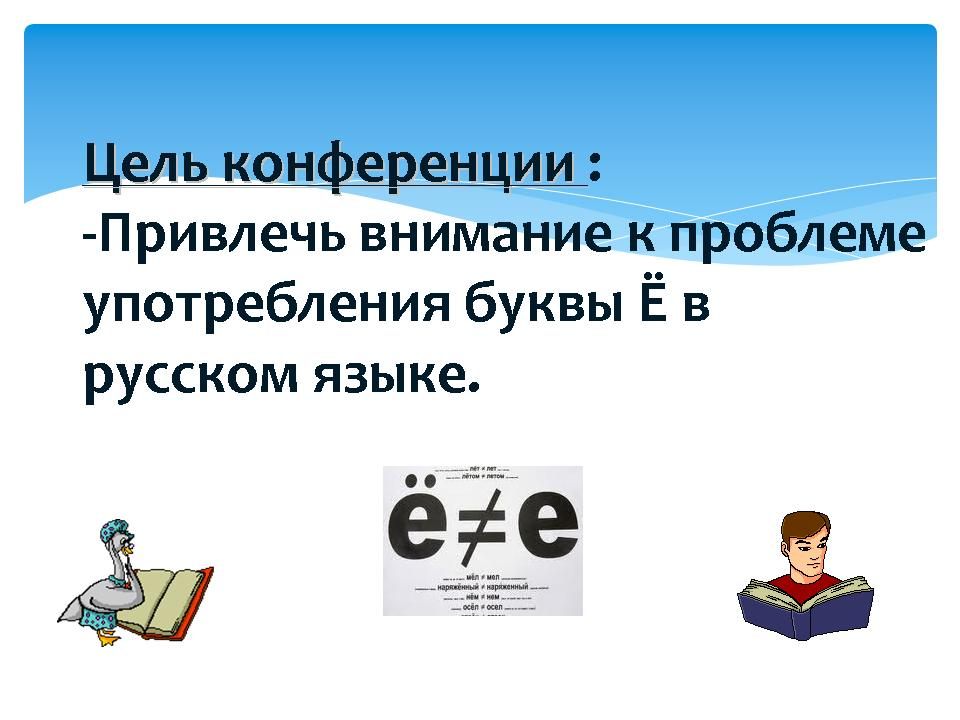

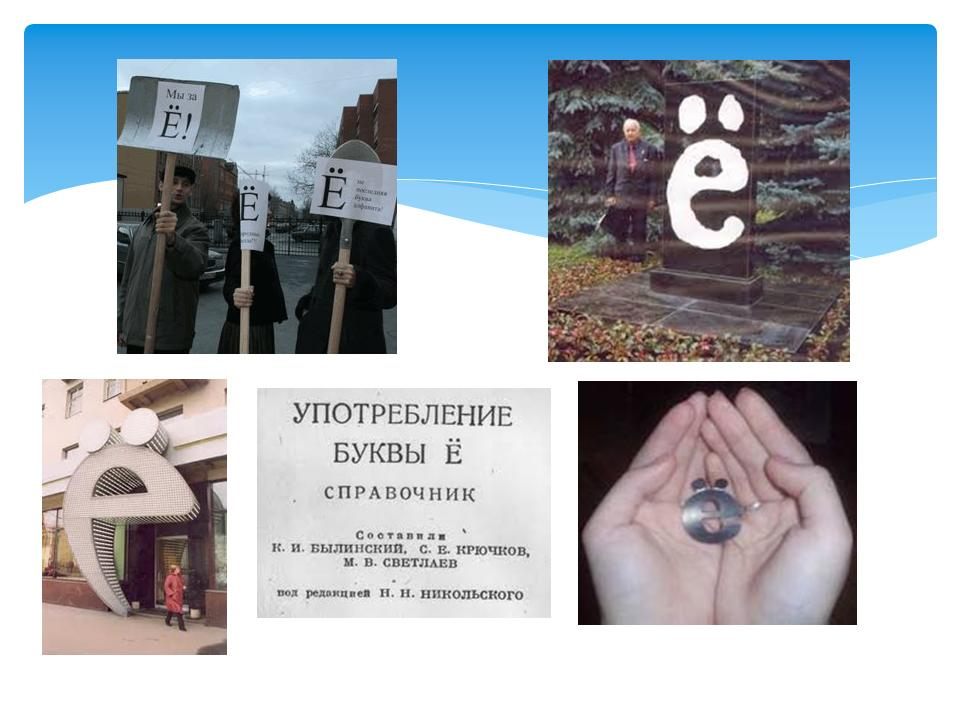
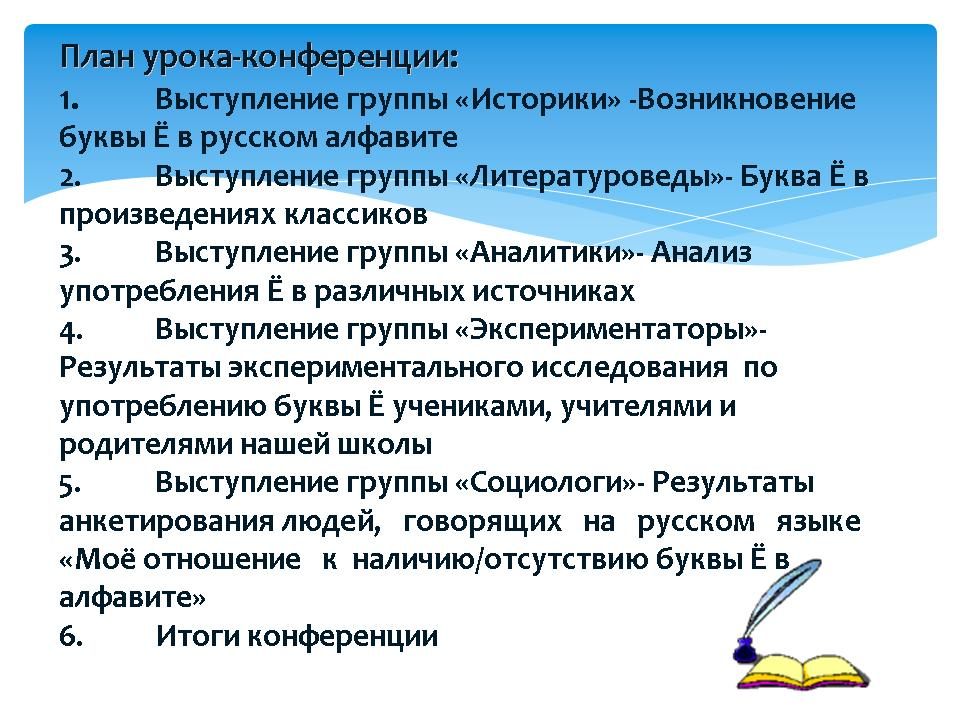
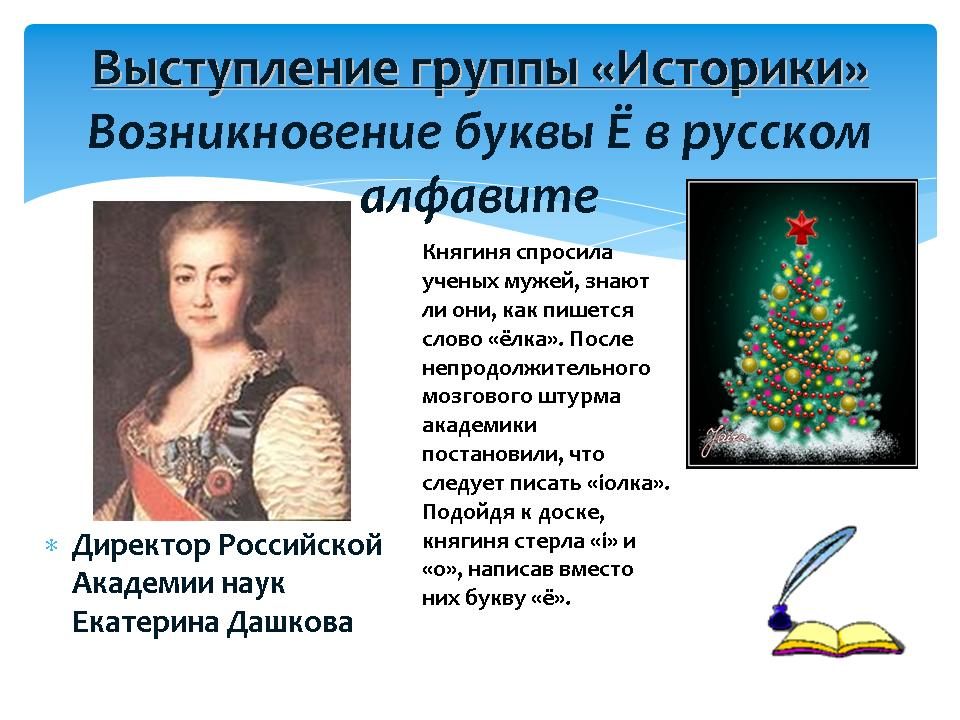
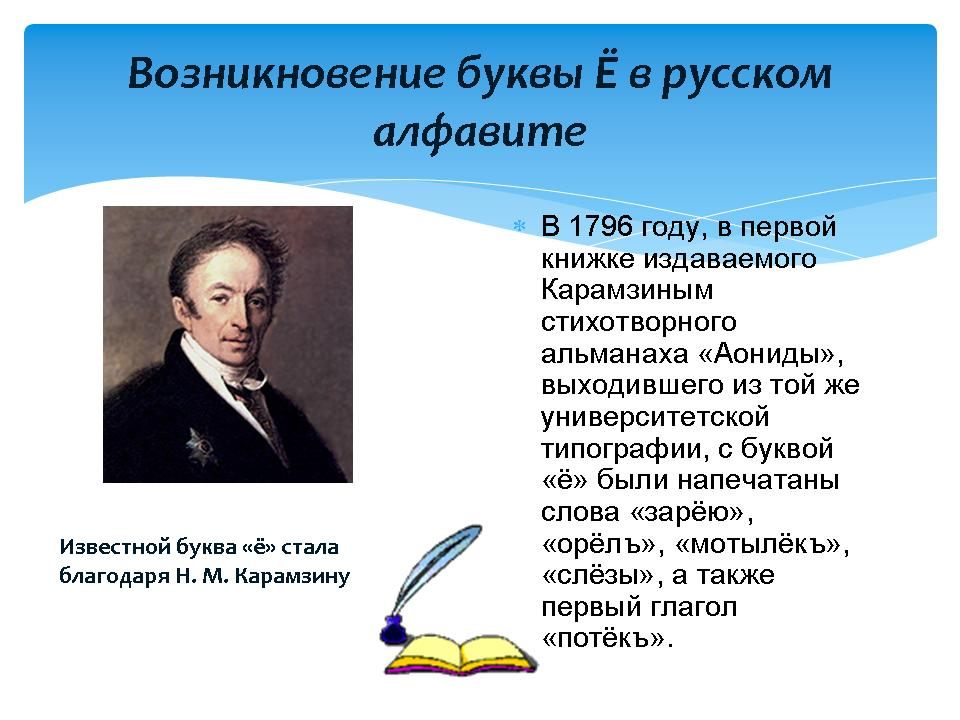
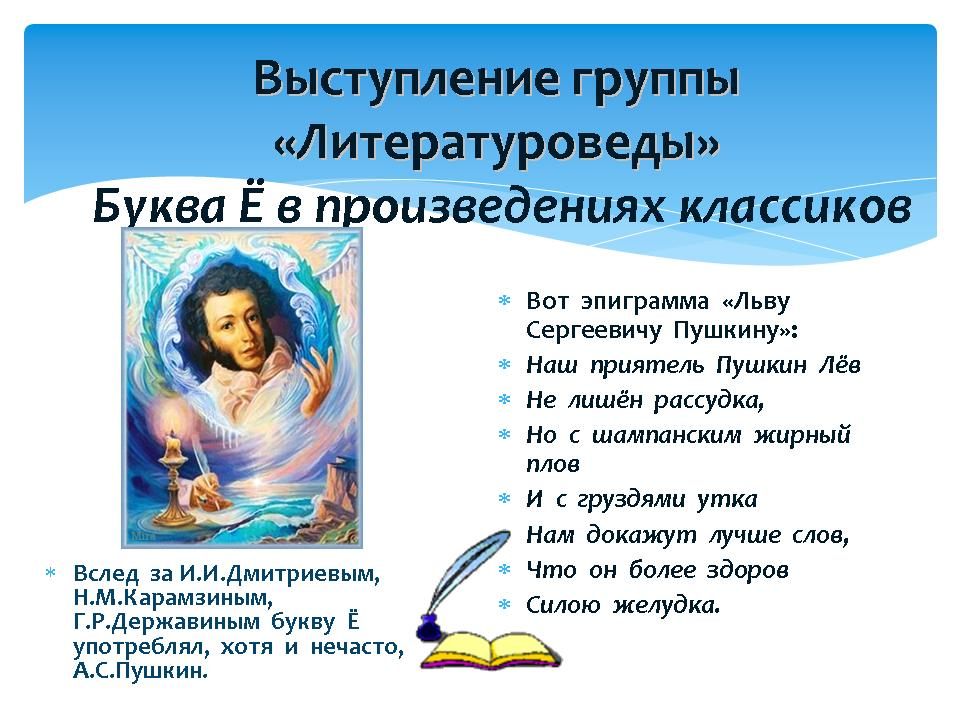
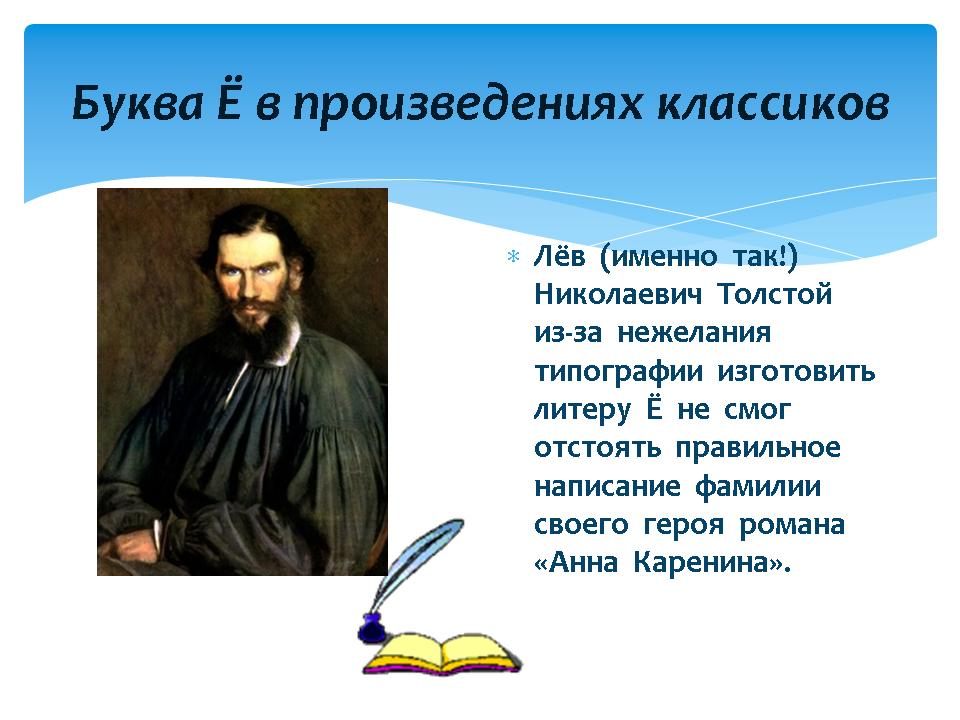

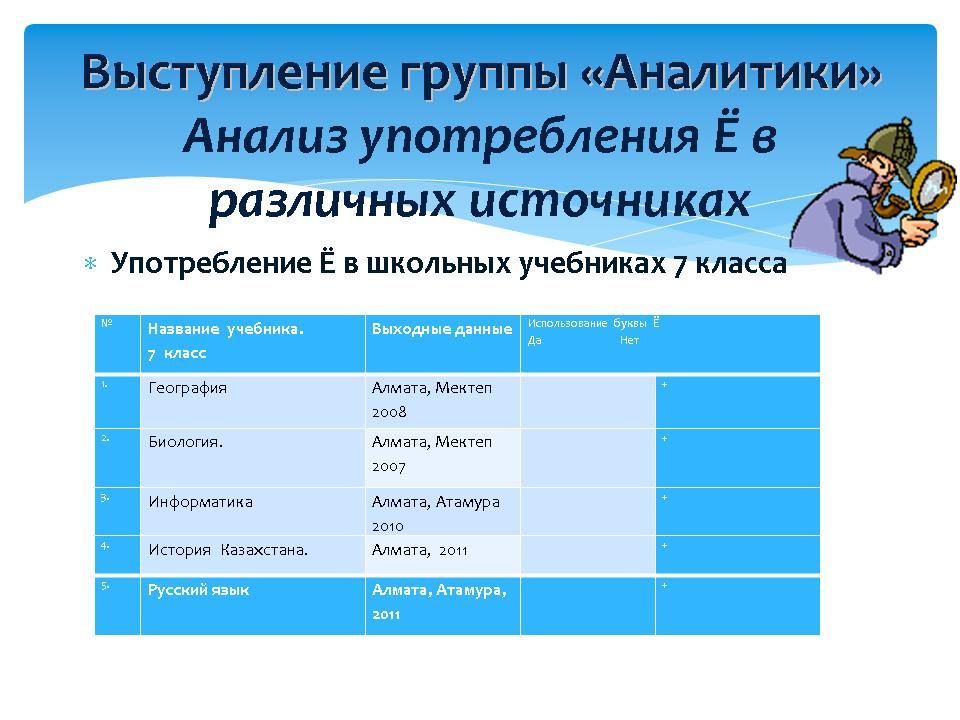
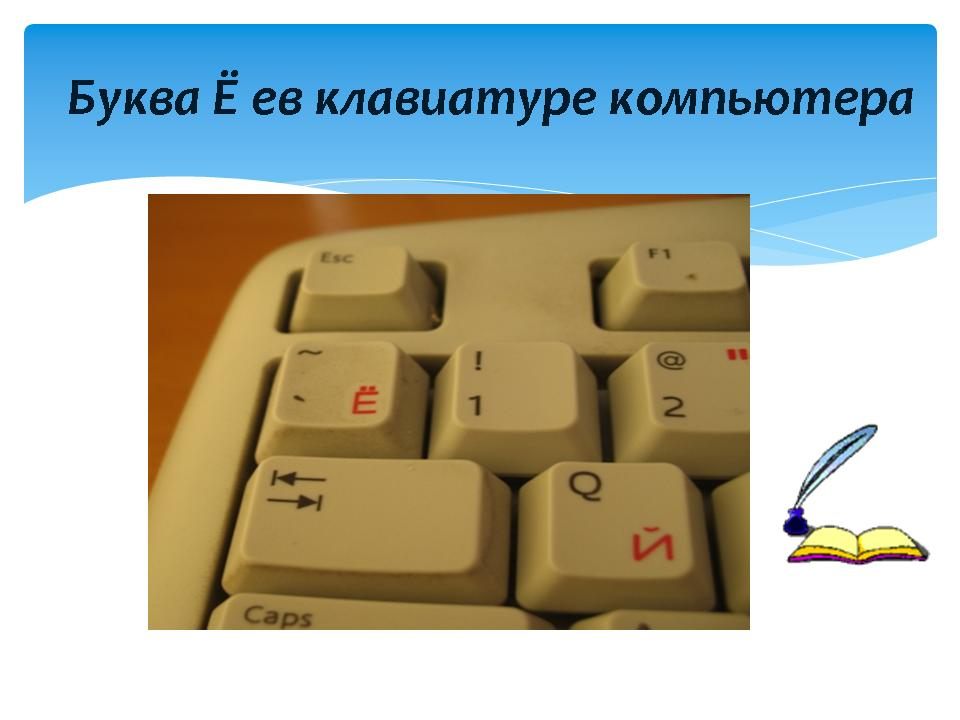
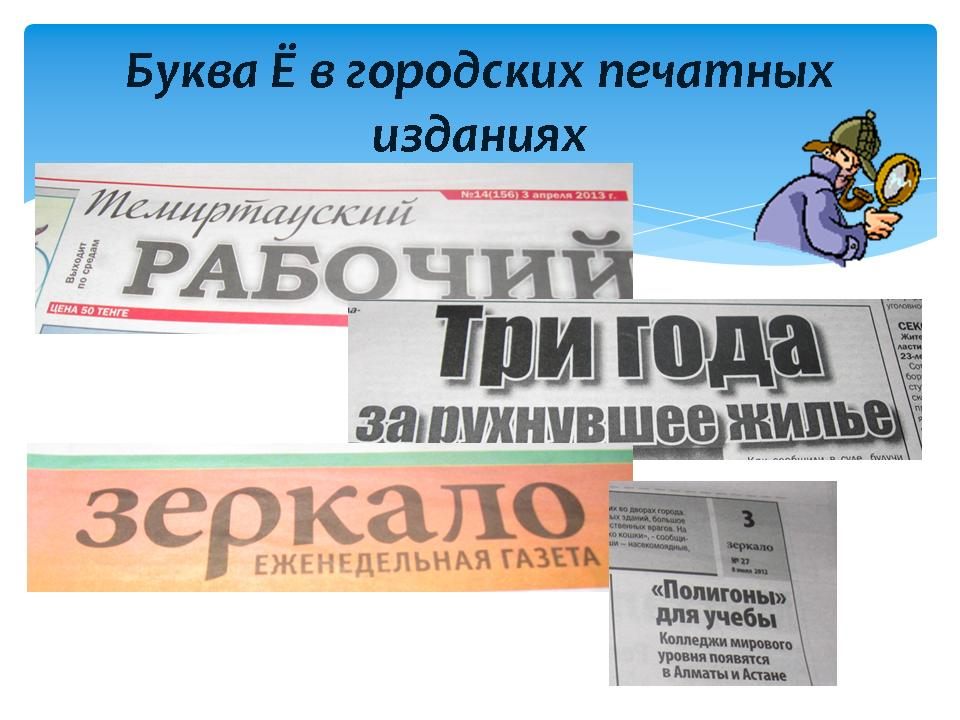
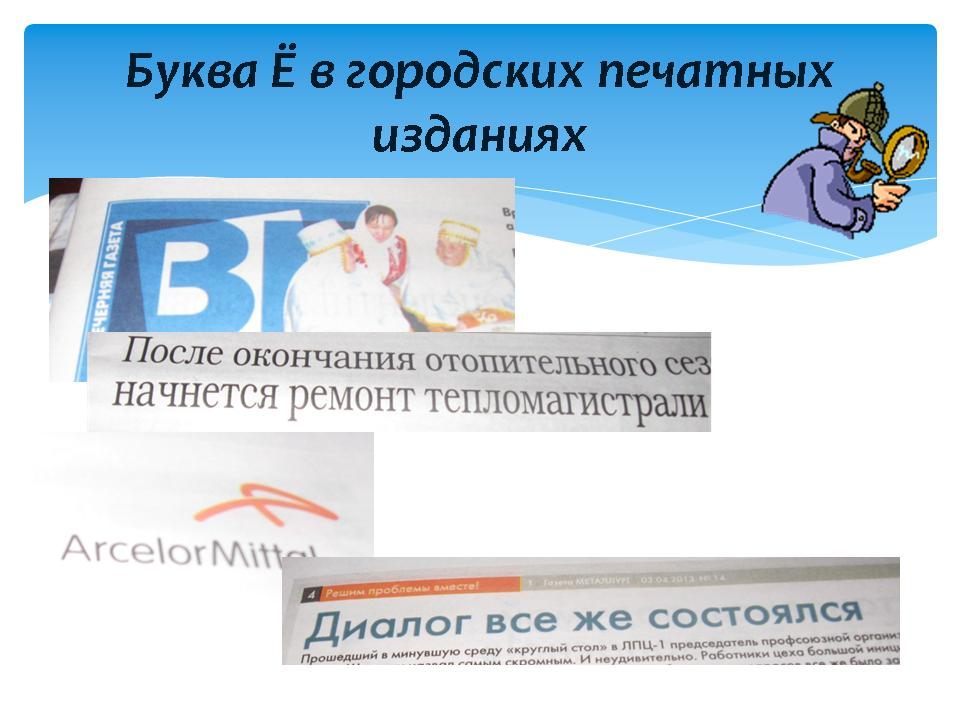
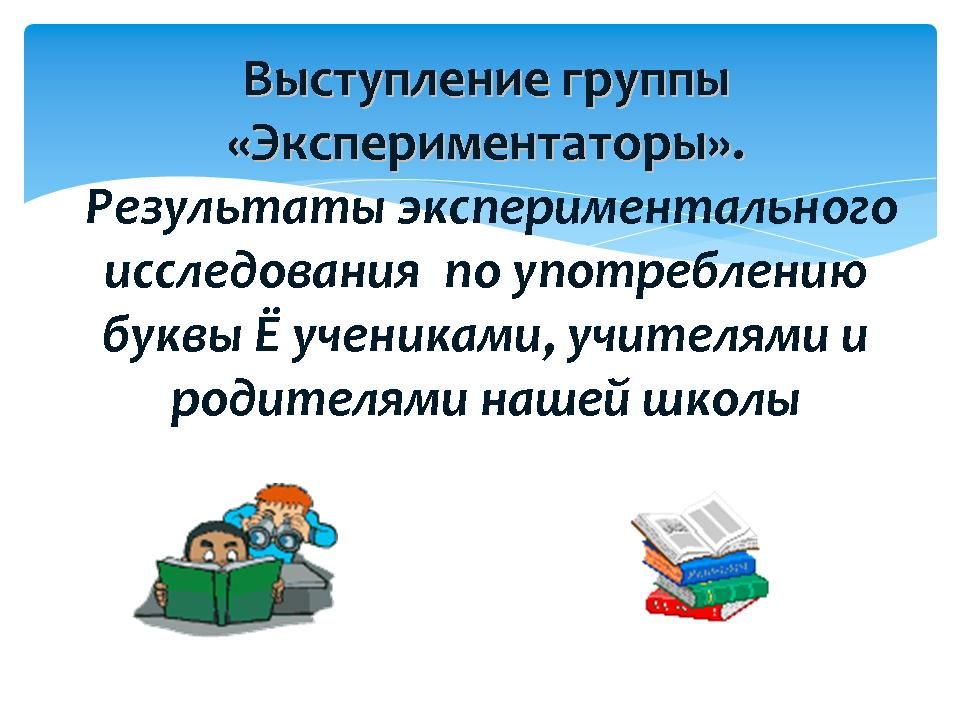
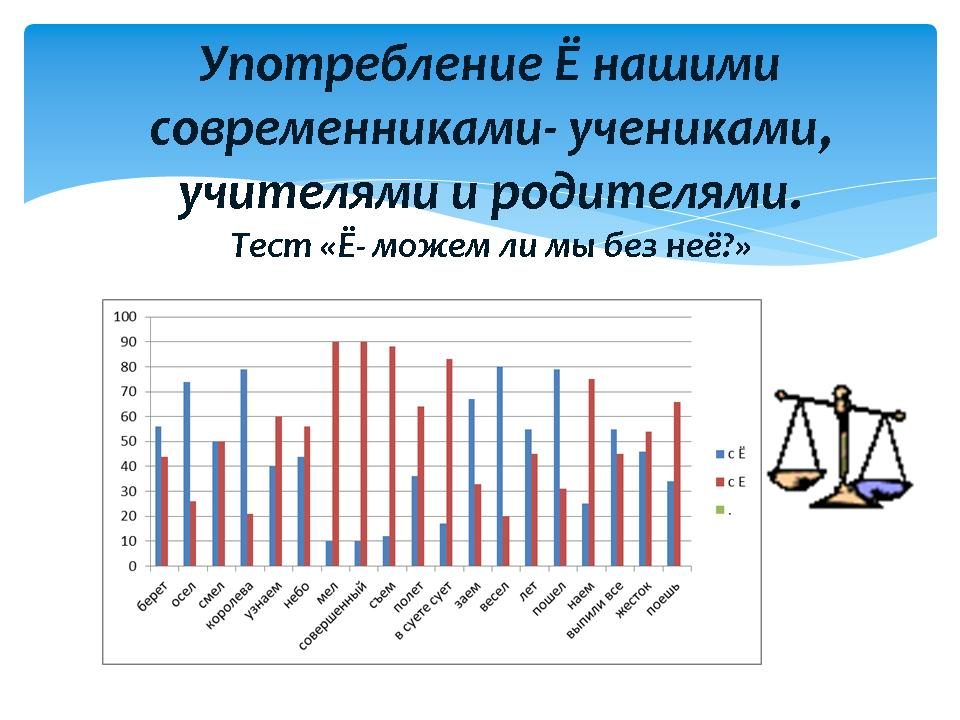
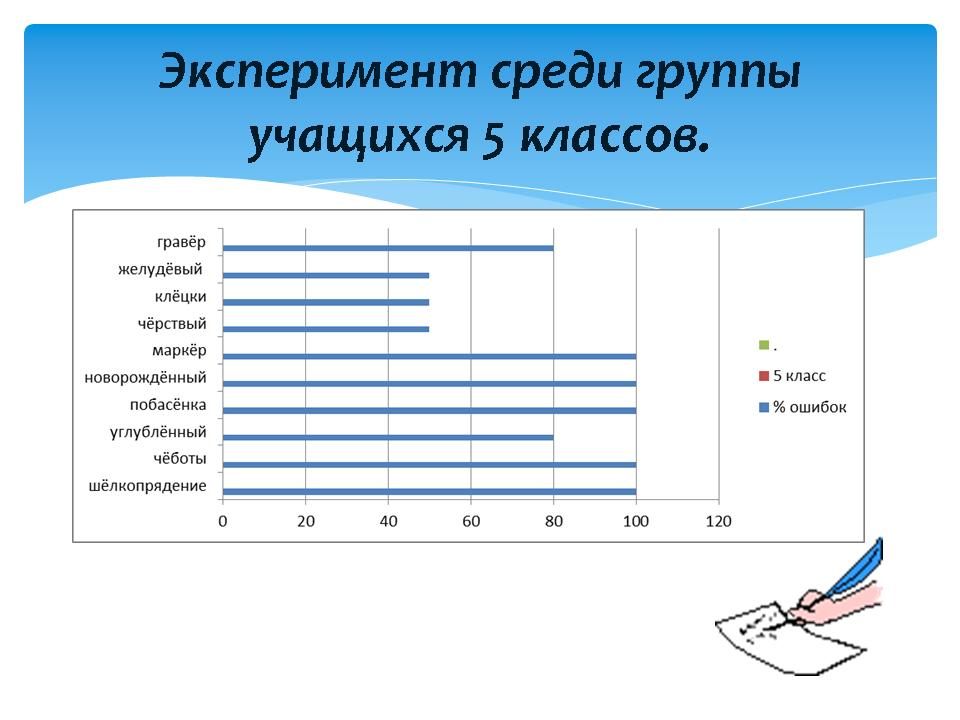
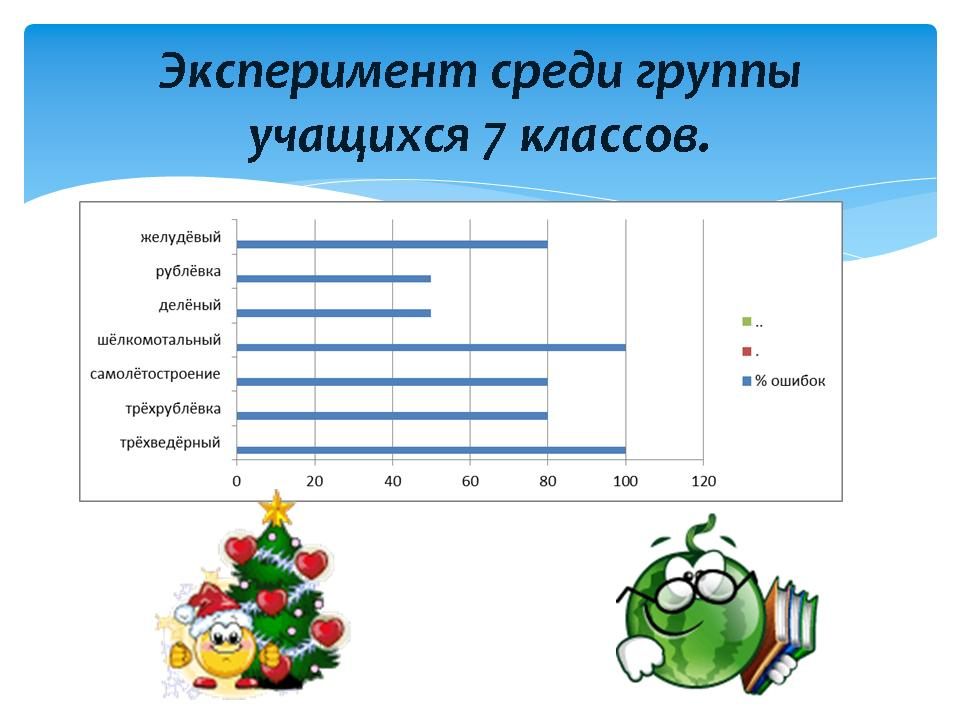



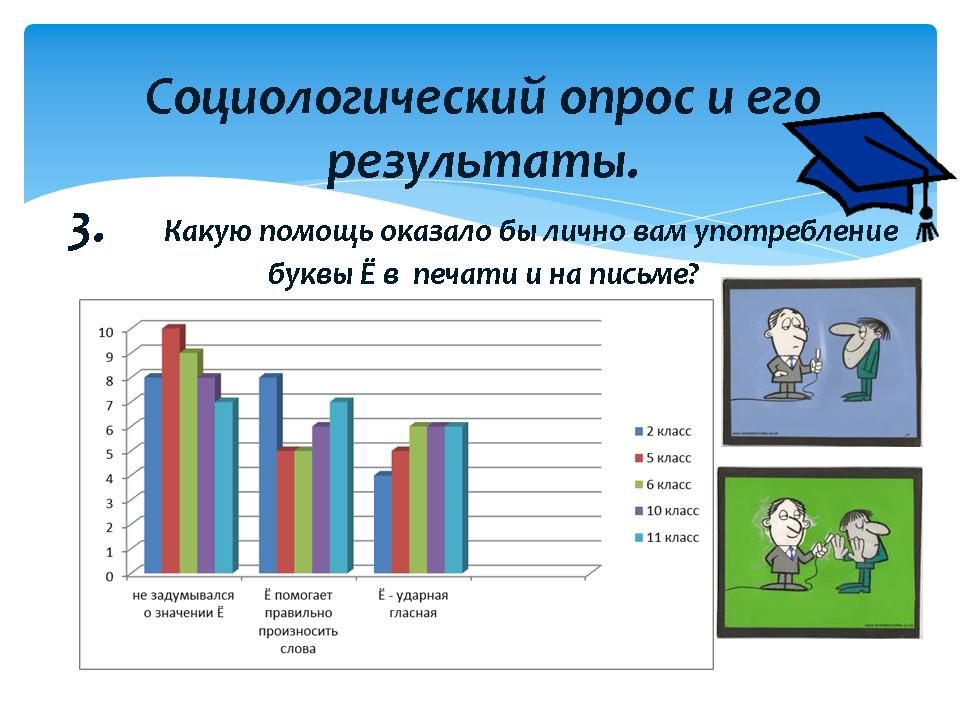
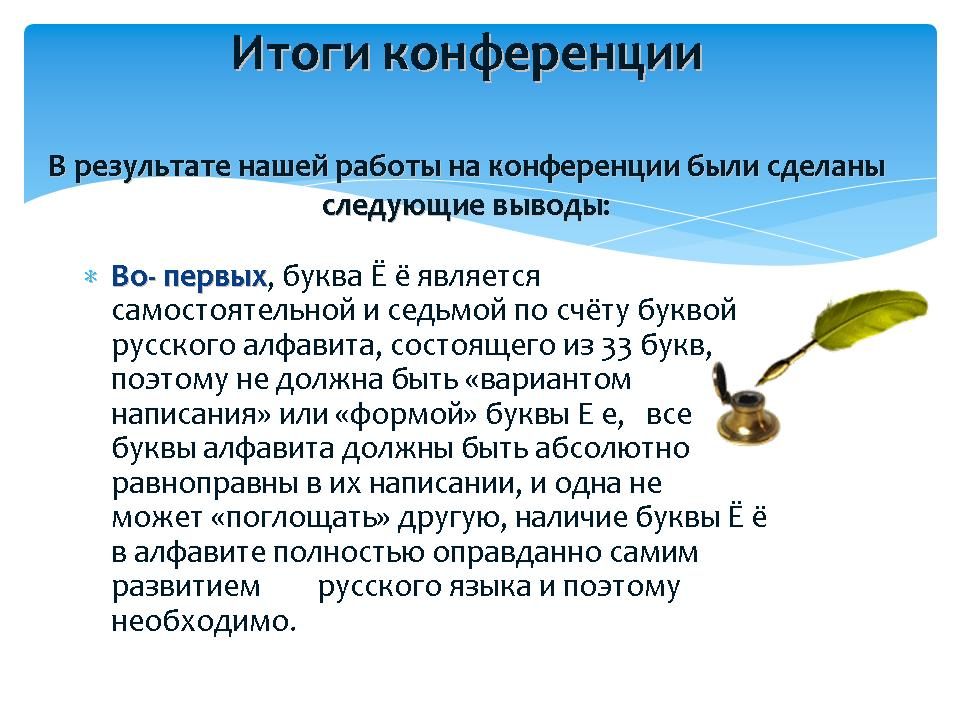
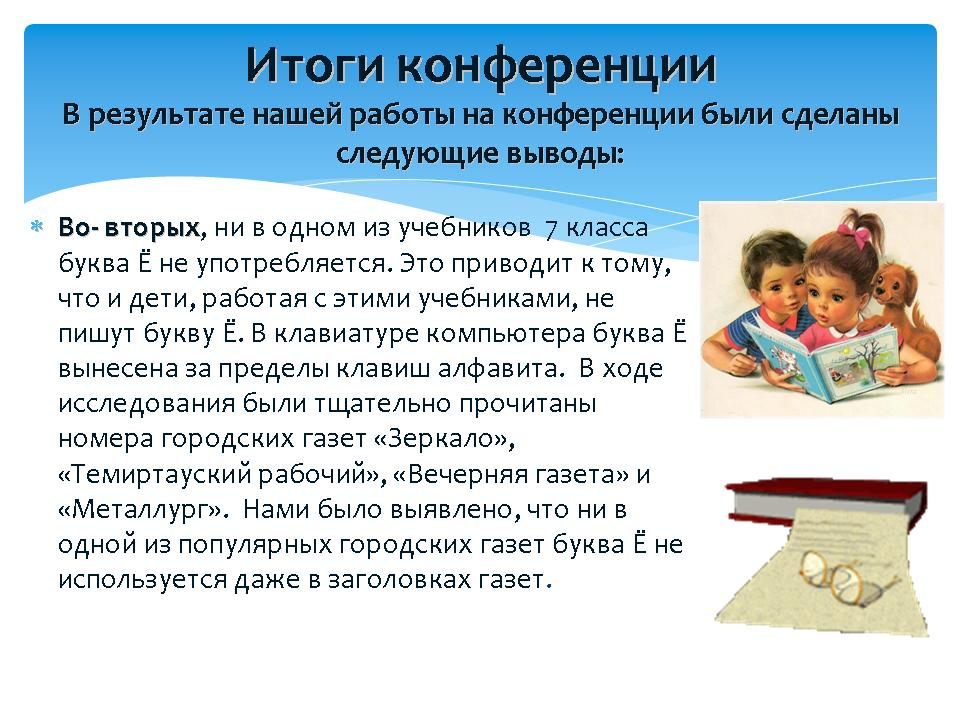
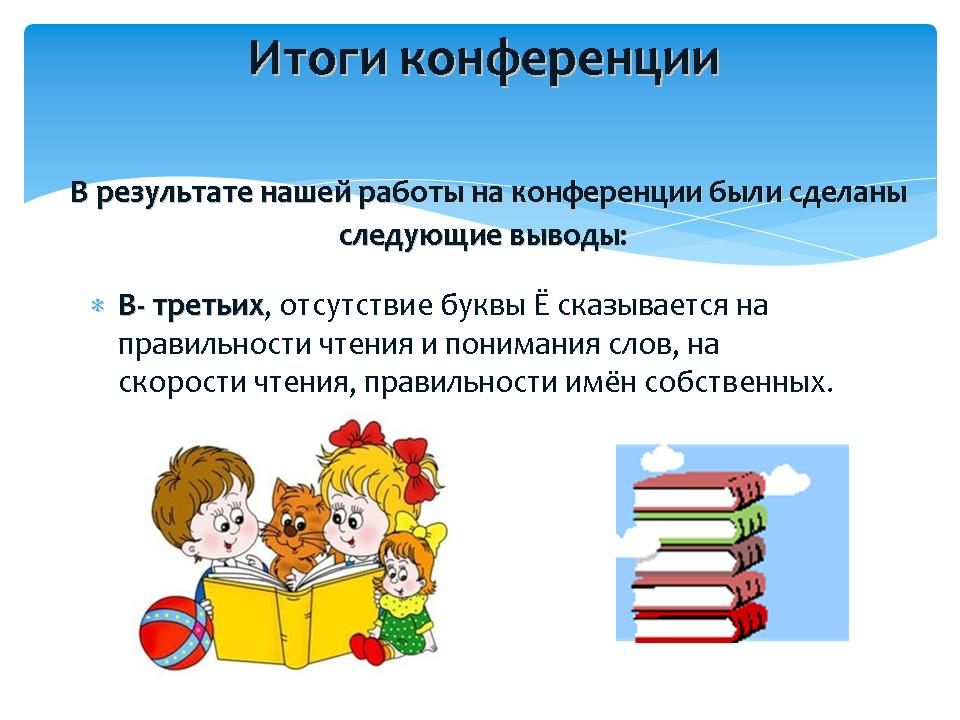
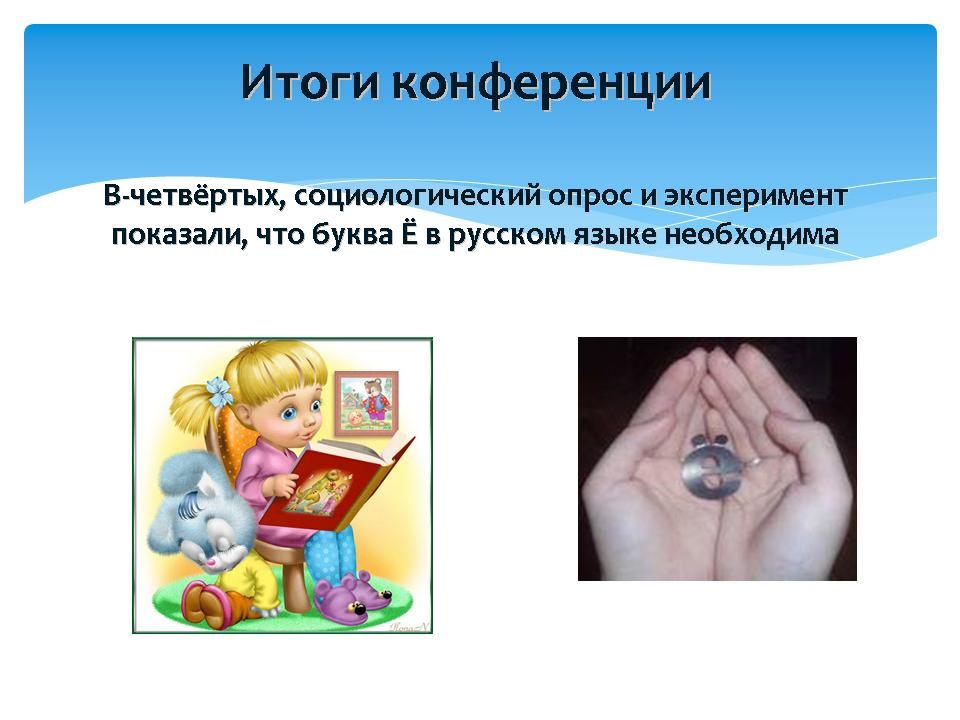
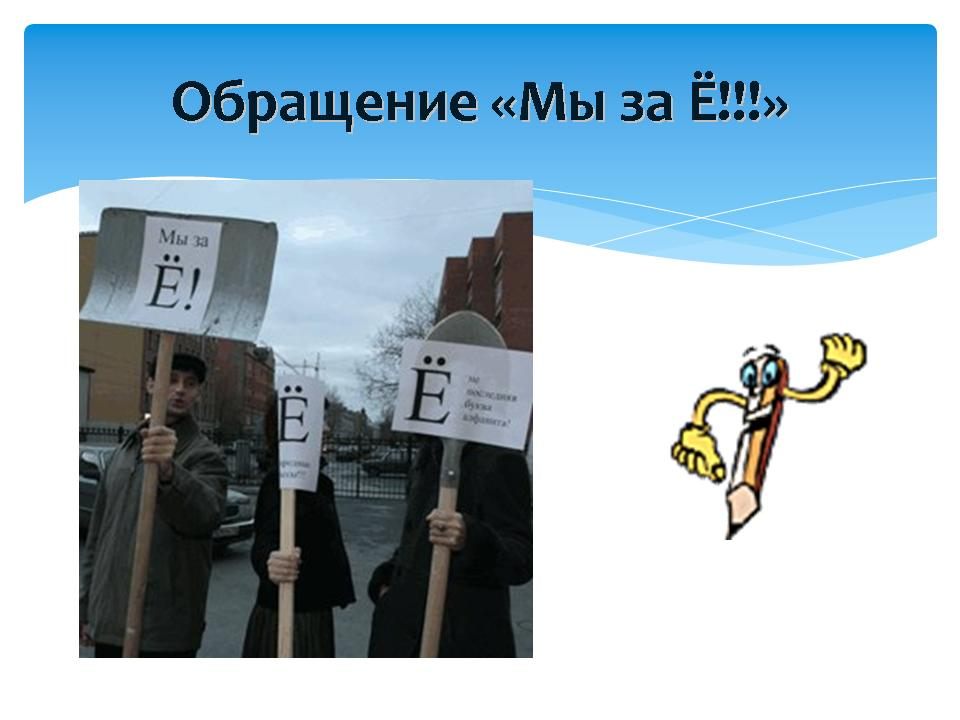
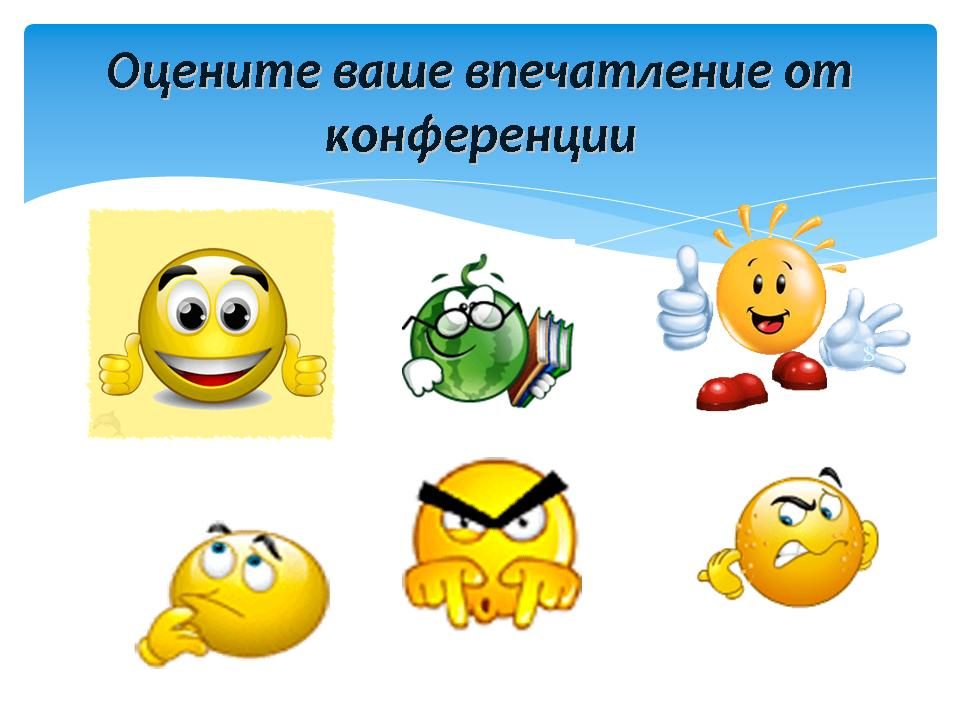
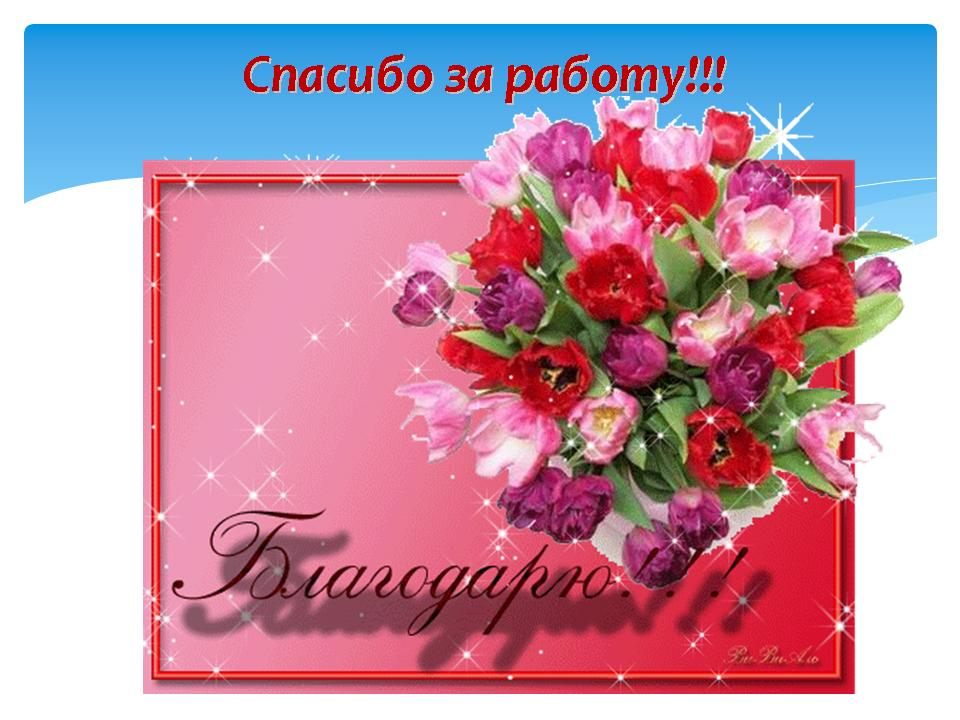
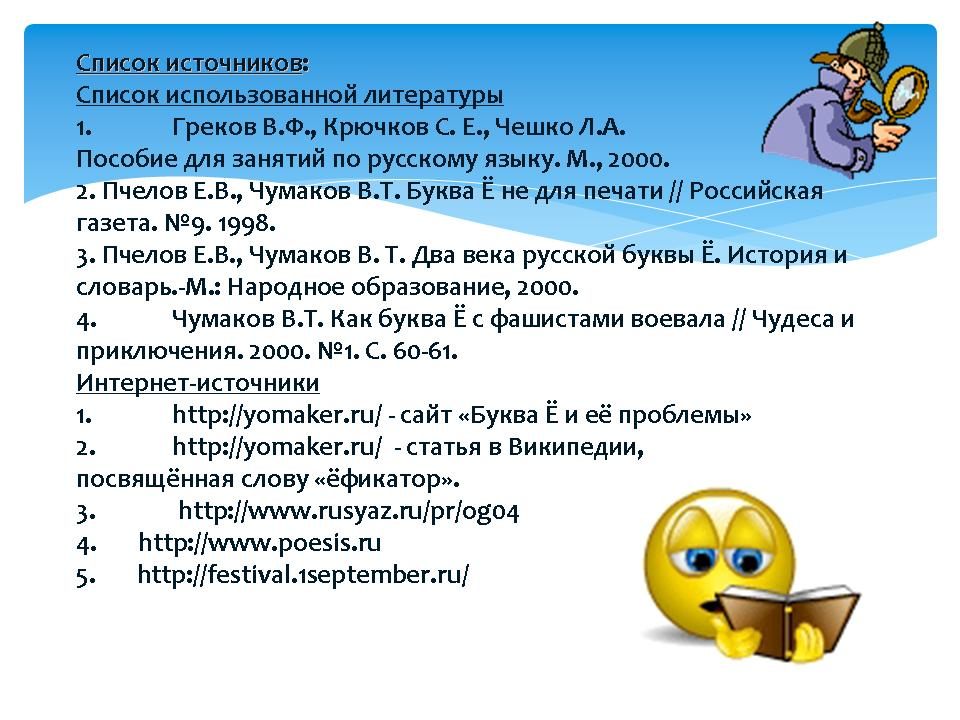 Back forward
Back forward
Attention! The slide preview is used for informational purposes only and may not give an idea of \u200b\u200ball the presentation features. If you are interested in this work, please download the full version.
Conference purpose - draw attention to the problem of using the letter ё in Russian.
Conference Objectives:
- Learn about the occurrence of the letter E in the Russian alphabet;
- To analyze the use of the letter E in various sources;
- To get acquainted with the results of the study of the use of the letter E by students, teachers and parents of our school;
- Determine the ratio of people speaking Russian to the presence / absence of the letter в in the alphabet;
- Present the main theses of classroom hours in a booklet for a wide range of readers (homework).
During the classes
1. Org. moment.
2. Greetings
3. Speech by the teacher.
Our lesson is devoted to one of the most interesting letters of the Russian alphabet - the letter E. How and when did it appear in the alphabet? Why is she currently on the verge of extinction? What are the consequences of this and can still lead? We will discuss all these problematic issues in this lesson.
We love to read. The road to the world of literature, to the country of knowledge helped us find the alphabet. When reading various books, we noticed that quite often they use E. instead of the letter E. This makes reading and comprehension difficult. And the reason for everything is one letter of the alphabet.
The alphabet is the main part and the main factor of alphanumeric writing. It contains the main characters of the letter. Other writing factors (graphics, spelling, punctuation) only develop and complement what the alphabet gives.
But lately, for about twenty years, there has been a debate among philologists about the quantitative composition of modern Russian alphabet. Some claim that there are only 33 letters, while others claim that there are 32 of them. So how many letters are 33 or 32? And what are the reasons or ambiguities and contradictions caused by?
Announcement of the topic and purpose of the conference Slides 1-4
Our meeting is dedicated to the culture of verbal communication. I hope it will be interesting and useful for you. I called her like this: "Y-to be or not to be? ...". And the subject of our attention will be the alphabet of the Russian language.
Conference purpose- draw attention to the problem of using the letter ё in Russian.
Conference Objectives:
Learn about the occurrence of the letter E in the Russian alphabet;
To analyze the use of the letter E in various sources;
To get acquainted with the results of the study of the use of the letter E by students, teachers and parents of our school;
Determine the ratio of people speaking Russian to the presence / absence of the letter в in the alphabet;
Present the main theses of classroom hours in a booklet for a wide range of readers (homework).
Conference Lesson Plan Slide 5:
- The performance of the group “Historians” - The emergence of the letter ё in the Russian alphabet
- Performance of the group “Literary scholars” - Letter ё in the works of classics
- Speech by the group “Analysts” - Analysis of the use of ё in various sources
- Speech of the group “Experimenters” - Results of an experimental study on the use of the letter учени by students, teachers and parents of our school
- Speech of the group “Sociologists” - Results of a survey of people who speak Russian “My attitude to the presence / absence of the letter E in the alphabet”
- Conference Summary
1. Speech of the group “Historians” - The emergence of the letter ё in the Russian alphabet (Appendix 1) Slides 6, 7
According to experts, the letter “ё” is the youngest letter in the alphabet, in 2010 it will be 227 years old. According to one version, this letter appeared in St. Petersburg on November 18 (old style) 1783. During a discussion of the Slavic Russian Dictionary project at one of the meetings of the Russian Academy of Sciences, its director Yekaterina Dashkova asked whether it is correct to depict one sound in two letters and cited as an example the word "iolka" / "fir-tree" /. On the same day, it was decided to introduce a new letter of the Russian alphabet - “ё”, and Dashkova became the “mother” of the new letter.
2. Performance of the group “Literary scholars” - the letter ё in the works of the classics (Appendix 2) Slides 8,9,10
We analyzed a number of books for children of preschool, primary and secondary school age. As a result, we came to the following conclusions.
In a number of books, the letter “e” is printed in all words where it is. For example: Artmonova E.V. Mirror: There is no turning back: A story. - M .: Eksmo, 2006 .-- 192 p. - (Horror stories).
In some publications, the letter “ё” is used inconsistently, and this irregularity of use is not explained by the accepted rules, fixed in the reference literature. So, in the book for preschoolers (“We Read for Kids”) “My Watch” (Prof-Press Publishing House, 2008) “ё” is printed in all the necessary words, and on the last page is omitted in the word “Everything”: “So that everyone keep up with everything, you have to get up with the sun. ” A similar situation is observed in books from the “School of the Seven Dwarfs” series of the Mosaic-Synthesis publishing house (we analyzed a set of books for classes with children from 1 to 2 years old).
3. Speech by the group “Analysts” - Analysis of the use of ё in various sources (Appendix 3) Slides 11-14
None of the textbooks in grade 7 use the letter ё. This leads to the fact that children, working with these textbooks, do not write the letter.. In the computer keyboard, the letter Ё is taken outside the keys of the alphabet. During the study, the numbers of the city newspapers Zerkalo, Temirtau Worker, Evening Gazette and Metallurg were carefully read. We have revealed that in none of the popular city newspapers is the letter ё used even in newspaper headlines. But the journalistic style of prints affects the consciousness of people and serves as a model for the use of both words and expressions in oral and written speech, and the letter E in a letter by readers of these publications.
Speech of the group “Experimenters” - Results of an experimental study on the use of the letter учени by students, teachers and parents of our school (Appendix 4) Slides 15-18
We tested 100 students, teachers and parents of our school of different classes
COGNITIVE TEST "Yo! CAN WE WITHOUT HER?"
Many people think that the letter “ё” is not needed. That she is dying and should be abolished. Take this little comic test and make sure that the letter “ё” has a right to exist.
¦ "TAKE" means ...
a) Headgear;
b) "Take" in the third person singular.
¦ "DONKEY" means ...
a) Moved down under his own weight;
b) An animal of the equine family, order of artiodactyls.
Conducted a small experiment.
Among the group of students of 5 classes. 20 people had to read words unfamiliar to them, in which instead of “ё” the letter “e” was printed. These are the words engraver, in-depth, newborn, goofy, cheboty, acorn, silkworm, dumplings, priests, marker. When reading, it turned out that 100% of students made reading errors. Moreover, 100% of the students made mistakes in the marker, cheboty, newborn, goofy, silkworm, 80% made mistakes when reading the words in-depth, engraver, 50% read the word acorn, dumplings with an error.
Conclusion: The absence of the letter E affects the correct reading and understanding of words, the speed of reading, the correctness of proper names.
4. Speech of the group “Sociologists” - Results of a survey of people who speak Russian “My attitude to the presence / absence of the letter E in the alphabet” (Appendix 5) Slides 19-22
Students of the 2nd, 5th, 6th, 10th, 11th grades of our school were offered the following questions:
1. Do you think it is obligatory to use the letter E in a letter and in print?
2. Do you always use the letter E yourself or not in the letter? If not, then why?
3. How would you personally benefit from using the letter E in the press and writing?
Conclusion: high school students are less likely to use the letter, than the elementary school students; many students do not realize the importance of using the letter. Correctly.
5. Results of the conference
The final word of the teacher. The teacher sums up and reads out the appeal based on the results of the lesson-conference.
Slides 23-26
Today we examined the appearance and disappearance of the letter ё from the Russian alphabet. But it is gratifying to note that now there is an ever wider introduction of the letter на to the pages of books and magazines. Now there are several dozen titles of periodicals in which the letter E is printed constantly. Widespread use of E began in the credits on television and we see the names of Seleznev, Podberezkin, Degtev, Ognev; other words: actor director and much more. It is gratifying that in our regional newspaper the letter ё is used.
Everyone who sincerely loves the Russian language experiences joy when a simple truth comes to people: the non-use of the letter ё in writing leads to a distortion and deformity of the Russian language.
It so happened that 33 letters were fixed in our alphabet and, I think, forever. Precisely 33, and this is a sacred number. Recall at least 33 heroes at Pushkin. Since 1710, when Peter 1 introduced the civilian font, the number of letters in the Russian letter decreased by exactly ten. And, probably, it is surprising that the letter зан took the seventh, and, of course, a consecrated position. Is this a game of chance or the will of providence?
And I would also like as many people as possible to realize that our alphabet is the foundation of our entire culture. This is the first principle of all Russian-speaking peoples. And therefore, discrimination of at least one letter leads to sad, destructive consequences for the Russian language, for our entire culture.
As a result of our work in the lesson, the following conclusions were made:
Firstly, the letter Yoyo is an independent and seventh letter of the Russian alphabet, consisting of 33 letters, therefore it should not be a “spelling variant” or “form” of the letter E e, all letters of the alphabet must be absolutely equal in their spelling, and one cannot “absorb” another, the presence of the letter ё ё in the alphabet is completely justified by the very development of the Russian language and therefore it is necessary.
Secondly, the letter Ё is not used in any of the textbooks of grade 7. This leads to the fact that children, working with these textbooks, do not write the letter.. In the computer keyboard, the letter Ё is taken outside the keys of the alphabet. During the study, the numbers of the city newspapers Zerkalo, Temirtau Worker, Evening Gazette and Metallurg were carefully read. We have revealed that in none of the popular city newspapers is the letter ё used even in newspaper headlines. But the journalistic style of prints affects the consciousness of people and serves as a model for the use of both words and expressions in oral and written speech, and the letter E in a letter by readers of these publications.
Thirdly, the absence of the letter E affects the correct reading and understanding of words, the speed of reading, the correctness of proper names.
Fourthly, a sociological survey and experiment showed that the letter в is necessary in Russian.
The materials collected by the groups while working on this issue, we will issue in a booklet for a wide range of readers, when getting acquainted with which there will be no doubt whether to use the letter E or not.
Message “We are for Yo !!!” Slide 27
We appeal to all students and teachers of our school and all people who speak Russian with a request to necessarily use the letter E - the seventh letter of the Russian alphabet, which we have undeservedly forgotten.
I thank all participants for their work !!! Slide 29
List of sources: Slide 30
List of references
- Grekov V.F., Kryuchkov S.E., Cheshko L.A. A manual for classes in the Russian language. M., 2000.
- Pchelov E.V., Chumakov V.T. The letter E is not for printing // Russian newspaper. No. 9. 1998.
- Pchelov E.V., Chumakov V.T. Two Centuries of the Russian Letter E. History and Dictionary. - M .: Public education, 2000.
- Chumakov V.T. As the letter E fought with the Nazis // Miracles and adventures. 2000. No1. S. 60-61.
Internet sources
- http://yomaker.ru/ - site “Letter ё and its problems”
- http://yomaker.ru/ - Wikipedia article on the word “fixer”.



